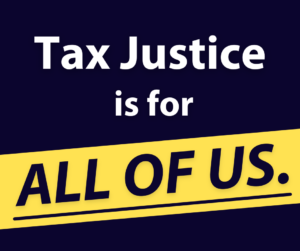
TAXES
Taxes are crucial to our nation’s well-being because they raise the reasonable revenue needed to pay for responsible programs. Any tax policy change should reduce the income gap, as well as the racial and gender wealth gaps.
Our Position
Catholic Social Justice teaches that every person belongs to a single and interconnected human family. We are called to invest in our shared society to meet the needs of all, especially those at the economic margins. When making individual and group decisions, we have a responsibility to consider the good of the community over the interests of the few. As Pope Francis said, “Working for a just distribution of the fruits of the earth and human labor is not mere philanthropy. It is a moral obligation.”1
NETWORK Advocates for Federal Policies That:
Raise reasonable revenue to invest in key programs and to reduce the national debt.
Right now, our tax policies favor the wealthiest in our nation and protect them from paying their fair share. Raising taxes on wealthy corporations and individuals will allow us to invest in key priorities, such as lowering health care costs, improving education, and enhancing Medicare and Social Security.
Taxes are our contribution to a flourishing society. Revenue raised through our tax system should be enough to pay for the public needs of society, and set us on a sustainable path to economic growth and stability. Neither families experiencing poverty nor ever-growing debt are healthy for our nation, and a just tax system addresses both through reasonable taxes.
Require everyone to pay their fair share.
The Tax Cuts and Jobs Act of 2017 significantly reduced taxes on the wealthiest families and individuals and large corporations, allowing them to pay less in federal taxes or to avoid taxes altogether. In our current system, those with excess wealth disproportionately benefit from our unjust tax code.
Each of us has a role to play in fostering the common good. Corporations and individuals do this by paying their fair share to support the valuable government programs that make the U.S. a good place to live and do business. The concept of a progressive tax system, where those who benefit most also contribute the most, is the most just way to collect taxes. The burden of taxation should not rest disproportionately on those who have the least; those who are able to pay more, must.
Create a more equitable and secure society by expanding tax credits to low-income taxpayers.
Our tax system provides significant tax benefits to wealthy individuals and corporations to incentivize certain behaviors, such as increasing savings for retirement. These incentives, however, are often structured so that low-wage workers cannot access them. The result is a system further perpetuating inequality by rewarding behaviors that generate additional financial security for those who already have it while excluding those working low wage jobs who need it most.
A just tax code should instead reward low income families’ work and savings. Programs like the Earned Income Tax Credit (EITC) and Child Tax Credit are vital and should be expanded to ensure working families benefit.









